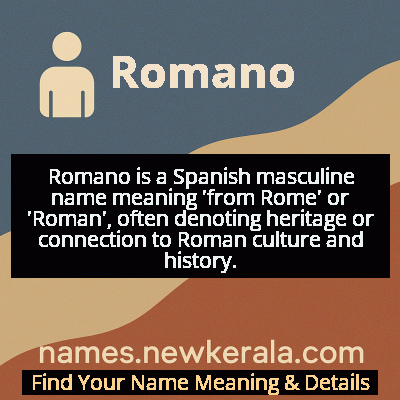Romano Name Meaning & Details
Origin, Popularity, Numerology Analysis & Name Meaning of Romano
Discover the origin, meaning, and cultural significance of the name ROMANO. Delve into its historical roots and explore the lasting impact it has had on communities and traditions.
Name
Romano
Gender
Male
Origin
Spanish
Lucky Number
4
Meaning of the Name - Romano
Romano is a Spanish masculine name meaning 'from Rome' or 'Roman', often denoting heritage or connection to Roman culture and history.
Romano - Complete Numerology Analysis
Your Numerology Number
Based on Pythagorean Numerology System
Ruling Planet
Uranus (Rahu)
Positive Nature
Strong sense of order, loyal, practical, and disciplined.
Negative Traits
Stubborn, overly serious, rigid, and prone to feeling restricted.
Lucky Colours
Blue, gray.
Lucky Days
Saturday.
Lucky Stones
Blue sapphire.
Harmony Numbers
1, 7, 8.
Best Suited Professions
Managers, engineers, accountants, organizers.
What People Like About You
Dependability, discipline, practicality.
Famous People Named Romano
Romano Mussolini
Jazz Musician
Established successful music career despite famous family background
Romano Prodi
Politician
Served as Prime Minister of Italy and President of European Commission
Romano Orzari
Actor
Prominent Canadian actor in both English and French cinema
Romano Scarpa
Comic Artist
Created numerous Disney characters and stories
Name Variations & International Equivalents
Click on blue names to explore their detailed meanings. Gray names with will be available soon.
Cultural & Historical Significance
Throughout medieval and Renaissance Spain, the name Romano gained additional layers of meaning as Spain positioned itself as heir to Roman imperial traditions, particularly during the reign of Charles V who styled himself as the new Roman Emperor. The name became associated with learning, classical education, and the humanist values that characterized the Spanish Golden Age. In contemporary Hispanic cultures, Romano continues to symbolize connection to European roots, classical education, and traditional values, often chosen by families who value historical continuity and cultural heritage. The name's journey from ancient Roman citizenship to modern Spanish identity demonstrates how names can serve as living connections to historical narratives and cultural traditions.
Extended Personality Analysis
Individuals bearing the name Romano typically exhibit personality traits that reflect the name's historical and cultural associations with Roman civilization. They often demonstrate natural leadership abilities, combined with practical intelligence and organizational skills that mirror the administrative prowess of ancient Rome. Romano's tend to be methodical thinkers who value structure and planning, approaching challenges with strategic consideration rather than impulsive reactions. Their personality often blends traditional values with modern adaptability, creating individuals who respect heritage while remaining relevant in contemporary contexts.
In social settings, Romano's are frequently perceived as reliable, trustworthy, and grounded individuals who form deep, meaningful relationships rather than numerous superficial connections. They often serve as stabilizing forces in their families and communities, embodying the Roman ideal of 'gravitas' – seriousness of purpose and emotional maturity. While sometimes appearing reserved or traditional, they typically possess strong convictions and the courage to defend their principles. Their approach to life tends to be pragmatic yet principled, balancing practical considerations with ethical commitments. Many Romano's develop interests in history, architecture, law, or other fields connected to the name's classical associations, though they equally excel in modern professions where their organizational skills and reliability prove valuable.
Modern Usage & Popularity
In contemporary naming practices, Romano maintains a distinctive presence as a masculine given name that bridges classical heritage with modern sensibilities. While not ranking among the most popular names in Spanish-speaking countries, it enjoys consistent usage as a sophisticated choice that appeals to parents seeking names with historical depth and international recognition. The name's usage patterns show interesting geographical variations, with stronger prevalence in regions with significant Roman historical connections or Italian cultural influence. In recent years, Romano has experienced a modest revival as part of the broader trend toward classical and heritage names, particularly among educated urban families who appreciate its cultural resonance and distinctive yet accessible sound. The name's modern appeal lies in its ability to convey strength and tradition without sounding archaic, making it suitable for professional contexts while maintaining personal significance. Digital naming trends indicate growing interest in Romano as parents increasingly research name meanings and historical connections online, with the name frequently appearing in discussions of classical European names and heritage naming traditions.
Symbolic & Spiritual Meanings
Symbolically, Romano embodies multiple layers of meaning that extend far beyond its literal translation of 'from Rome.' The name represents the enduring legacy of Roman civilization – its architectural genius, legal systems, military discipline, and cultural achievements that fundamentally shaped Western society. Metaphorically, Romano symbolizes foundation and structure, much like the Roman architectural principles that emphasized durability, symmetry, and functionality. The name carries connotations of empire and civilization-building, representing organizational ability, strategic vision, and the capacity to create lasting institutions. In personal symbolism, Romano often indicates someone who serves as a pillar of strength in their community or family, embodying the Roman virtues of honor, loyalty, and duty while adapting these traditional values to modern contexts. The name's connection to Rome's status as the 'eternal city' adds profound symbolic dimensions related to permanence, legacy, and timeless relevance. Romano also symbolizes cultural transmission and historical continuity, representing how classical ideals and achievements continue to influence contemporary life through language, law, architecture, and philosophical concepts that originated in ancient Rome but remain vital today.

